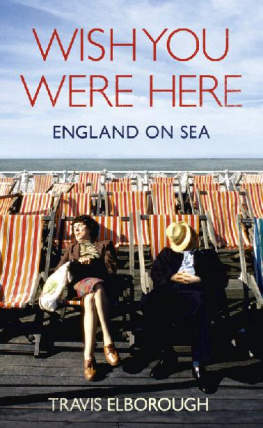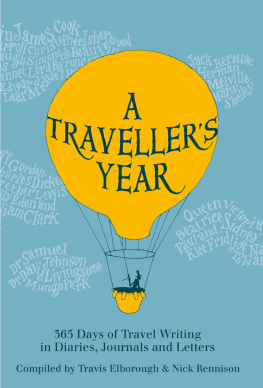Travis Elborough - Wish You Were Here: England on Sea
Here you can read online Travis Elborough - Wish You Were Here: England on Sea full text of the book (entire story) in english for free. Download pdf and epub, get meaning, cover and reviews about this ebook. year: 2010, publisher: Hodder & Stoughton, genre: Romance novel. Description of the work, (preface) as well as reviews are available. Best literature library LitArk.com created for fans of good reading and offers a wide selection of genres:
Romance novel
Science fiction
Adventure
Detective
Science
History
Home and family
Prose
Art
Politics
Computer
Non-fiction
Religion
Business
Children
Humor
Choose a favorite category and find really read worthwhile books. Enjoy immersion in the world of imagination, feel the emotions of the characters or learn something new for yourself, make an fascinating discovery.
- Book:Wish You Were Here: England on Sea
- Author:
- Publisher:Hodder & Stoughton
- Genre:
- Year:2010
- Rating:4 / 5
- Favourites:Add to favourites
- Your mark:
- 80
- 1
- 2
- 3
- 4
- 5
Wish You Were Here: England on Sea: summary, description and annotation
We offer to read an annotation, description, summary or preface (depends on what the author of the book "Wish You Were Here: England on Sea" wrote himself). If you haven't found the necessary information about the book — write in the comments, we will try to find it.
Wish You Were Here: England on Sea — read online for free the complete book (whole text) full work
Below is the text of the book, divided by pages. System saving the place of the last page read, allows you to conveniently read the book "Wish You Were Here: England on Sea" online for free, without having to search again every time where you left off. Put a bookmark, and you can go to the page where you finished reading at any time.
Font size:
Interval:
Bookmark:
Wish You Were Here
Travis Elborough

www.hodder.co.uk
Also by Travis Elborough
The Bus We Loved: Londons Affair with the Routemaster
The Long-Player Goodbye: The Album from Vinyl to iPod and Back Again
First published in Great Britain in 2010 by Sceptre
An imprint of Hodder & Stoughton
An Hachette UK company
Copyright Travis Elborough 2010
The right of Travis Elborough to be identified as the Author of the Work has been
asserted by him in accordance with the Copyright, Designs and Patents Act 1988.
All rights reserved. No part of this publication may be reproduced, stored in a retrieval system,
or transmitted, in any form or by any means without the prior written permission of the publisher,
nor be otherwise circulated in any form of binding or cover other than that in which it is
published and without a similar condition being imposed on the subsequent purchaser.
A CIP catalogue record for this title is available from the British Library.
Epub ISBN 9781444714616
Book ISBN 9780340935101
Hodder & Stoughton Ltd
338 Euston Road
London NW1 3BH
www.hodder.co.uk
For George and Joan
Contents
Introduction
Figuratively Speaking The Seaside as a Prelapsarian Realm Pirate-Themed Eateries and the Obligatory Autobiographical Bit The Staycation Nation The Same Old Excuses for What Follows
When you think about it, the metaphors are not encouraging. Figuratively speaking, to be at sea is to be lost, confused or lacking knowledge and competence. Ditto for adrift. On dry land it is a pejorative that reeks of purposelessness and the absence of guidance or intention. Beached, while describing a physical condition suffered by oil tankers, seals and whales, can be deployed for any moment of stranded helplessness. Or even abandonment and death. And consulting the nearest dictionary to hand for the phrase washed up, I find, informal: no longer effective or successful. A definition that, though accurate, seems too mechanistic and skimps on all the emotive, associative images with alcoholism and those pickled former West End or Hollywood stars dowsing their grapefruit in vodka each sunup. The type whose days end in floods of tears and gin; spiders legs of mascara scampering down now ravished Faces of 1929 as they contemplate their long-vanished fame in ever advancing states of infirmity, forgetfulness and inebriation. And, as often as not, in coastal bungalows or seaside retirement homes. In ancient Greek mythology, after all, the aquatic and alcoholic were often conjoined; Dionysus, the god of wine, transforms a band of Tyrrhenian pirates into dolphins after foiling their attempt to sell him into slavery. And for Homer in The Iliad and The Odyssey , the sea is frequently wine dark.
So if the oceans are to be plundered for anything in the English language, it is largely as fonts of negative imagery. For every shipshape and sailing by there is a sunk, marooned, out of your depth or wrecked. This pessimism may or may not be a direct result of Great Britain possessing some 11,072.76 miles of damp, frequently unforgiving coastline and a climate that swathes everything in drear halftones for large parts of the year. But that coastline and that weather are the things that define us above all else.
As Jonathan Raban notes in the Oxford Book of the Sea , to leave these isles is to go overseas. Whether the occupants of this island are by dint of their curious, mongrel genetic inheritance simply naturally predisposed to view the world, and by extension that coastline and that weather, in purely glass half-empty terms, continues to be a matter of debate. (At least, among tanked-up barroom philosophers in draughty, badly lit pubs discoursing over beers on long, rain-lashed, winter evenings, anyway.)
What is not up for argument, however, is that the English are, by and large, a nation of Eeyores. The mere existence of A.A. Milnes Eeyore, possibly the most maudlin but best loved character in the annals of childrens literature, speaks volumes about the national psyche. Any country that can take a pessimistic toy donkey that lives in a corner of 100 Acre Wood called the Gloomy Place, so eagerly to its hearts is unlikely to possess the cheeriest of dispositions. But then, being pessimistic is not quite the same as being unhappy. It is something of a clich that the English are never happier than when complaining. And up until fairly recently, complaining about our seaside towns, once one of the few spheres in the land given almost solely over to fun, had been close to a national sport. A sport where there was an almost perverse pleasure or pride, perhaps, in gloating over their apparent awfulness.
Bill Cormack wrote in his 1998 book A History of Holidays: 1812-1990 , that the high summer of the English holiday resort is over. Some have deteriorated so much that they have become vulgar, almost squalid. Even day-trippers have deserted them. Few, in all honesty, would probably have disagreed with him then. Nor disputed his claim that when contrasted with the holidaying attractions of Spain, where it always seems warm and sunny even in November and drink went on until the small hours, indigenous resorts had a tricky job on their hands.
Publishing its first survey of Britains Crap Towns in 2003, the Idler magazine placed three resorts (Morecambe, Bexhill and Hythe) in its top ten. A further four (Brighton, Aldeburgh, Hayling Island and Hastings) had respectable rankings in the full list of fifty. If hardly a serious exercise and frequently just plain rude, the presence of so many resorts in a comic roll call of national shame that included Cumbernauld, the concrete Scottish new town widely derided as an atrocity of post-war planning, was indicative enough all the same.
Even in a recent film about the life of the record producer Joe Meek, coastal gigs are virtually synonymous with failure. Hes got me doing all these seaside towns, a disgruntled Heinz Burt spits at Meek in one scene. J.J. Feild, playing the Southampton bacon slicer turned platinum blonde rocker and Arthur Askey-supporting summer seasoner, rings every ounce of fury out of those last two words. Elsewhere in the picture it is implied that the creation of the chart-topping 1962 hit Telstar that lends the movie its name, was nearly derailed by Tornados drummer Clem Cattinis insistence on fulfilling a booking in Great Yarmouth. And all this from men responsible for Blackpool Rock and The Ice Cream Man a pair of echo-laden instrumentals stuffed with the usual Meek studio gimcracks that trill with the same plaintive urgency as the chimes on a Stop Me And Buy One van. If not the maudlin and rather marshal ching-a-ling of a fairground Merry-Go-Round organ to boot. And for all of its associations with the out of this world, there was always a touch of the Tower Ballroom Wurlitzer about the Clavioline keyboard Meek used on many of his arrangements. But then the film is pandering to received ideas about seaside resorts as decrepit, and potent emblems of decay, for comic and dramatic effect. These ideas, and their realities for that matter, were far less advanced in Meeks day than our own.
At the Festival of Britain in 1951, an event staged to persuade the world that the country was back on its feet after the war, a replica seafront joined such thrusting totems of modernity as the Skylon, on Londons South Bank. As an entry for the exhibit in the Festivals guidebook helpfully explained, Whenever the British feel the need to relax either after a heavy week in their industrial cities or a hard year on the land they tend to head to the sea. Written in English by Ian Cox, its words were obviously intended for the benefit of foreign visitors whod mastered the language but remained somewhat perplexed about national customs. Further on, Cox maintains that every stick of lettered seaside rock, a confection that dates back to the 1870s at the earliest, contains an ancient mystery a conundrum on a par, presumably, with the riddle in the sands or the standing stones at Stonehenge. (Though with sweets only just off the ration at that point, where these supplies of rock came from might possibly have presented a bigger mystery to festival-goers.) More compellingly, he goes on to define a characteristically British seafront. In his view, it is a medley of Victorian boarding houses, elegant bow-fronted Regency facades, ice-cream parlours, pubs, and the full and friendly gaudiness of the amusement park.
Next pageFont size:
Interval:
Bookmark:
Similar books «Wish You Were Here: England on Sea»
Look at similar books to Wish You Were Here: England on Sea. We have selected literature similar in name and meaning in the hope of providing readers with more options to find new, interesting, not yet read works.
Discussion, reviews of the book Wish You Were Here: England on Sea and just readers' own opinions. Leave your comments, write what you think about the work, its meaning or the main characters. Specify what exactly you liked and what you didn't like, and why you think so.











